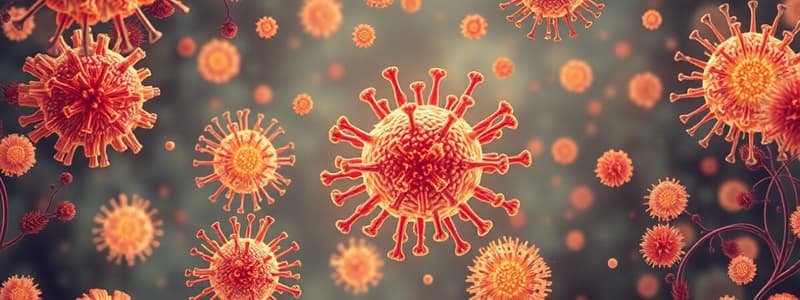Podcast
Questions and Answers
What constitutes the first line of defense in innate immunity?
What constitutes the first line of defense in innate immunity?
- Inflammatory response
- Antibody production by plasma cells
- Phagocytic cells and NK cells
- Skin and mucosal linings (correct)
Which bio-chemical barrier is NOT part of innate immunity?
Which bio-chemical barrier is NOT part of innate immunity?
- Antimicrobial peptides
- Sweat and tears
- Immunoglobulin production (correct)
- Normal bacterial flora
What is the role of T helper cells in adaptive immunity?
What is the role of T helper cells in adaptive immunity?
- They directly kill infected cells
- They are involved in the inflammatory response
- They activate and regulate the immune response (correct)
- They differentiate into memory cells only
Which of the following best describes the process of white blood cell (WBC) extravasation?
Which of the following best describes the process of white blood cell (WBC) extravasation?
What type of cells are responsible for presenting antigens to T cells?
What type of cells are responsible for presenting antigens to T cells?
Which physiological change occurs during the inflammatory response?
Which physiological change occurs during the inflammatory response?
What defines a host in the context of infections?
What defines a host in the context of infections?
What is the significance of the complement system in innate immunity?
What is the significance of the complement system in innate immunity?
Flashcards
Innate Immunity
Innate Immunity
The body's first line of defense against pathogens, involving physical and chemical barriers and various cells.
Adaptive Immunity
Adaptive Immunity
A specific immune response that develops over time and targets particular pathogens.
Inflammatory Response
Inflammatory Response
The body's reaction to tissue damage or infection, characterized by redness, heat, swelling, pain, and loss of function.
Phagocytosis
Phagocytosis
Signup and view all the flashcards
Physical Barriers (Immune)
Physical Barriers (Immune)
Signup and view all the flashcards
T helper cells (CD4+)
T helper cells (CD4+)
Signup and view all the flashcards
Pathogen
Pathogen
Signup and view all the flashcards
Hypersensitivity Disorder
Hypersensitivity Disorder
Signup and view all the flashcards
Study Notes
Host Defense Mechanisms
-
Innate Immunity: The body's first line of defense against pathogens.
- First Line of Defense: Physical and mechanical barriers (skin, linings of GI/GU/Respiratory tracts; sloughing, mucus/cilia, coughing/sneezing) and biochemical barriers (sweat, saliva, tears, sebum, normal flora, antimicrobial peptides like defensins and collectins, complement system).
- Second Line of Defense: Inflammatory response triggered by infection, damage, etc. Characterized by local manifestations (redness, heat, swelling, pain, loss of function) and a vascular response (dilation, increased permeability, white blood cell extravasation—rolling, firm adhesion, transmigration).
- Cells of Innate Immunity:
-
Neutrophils: Phagocytic cells; recognize and engulf bacteria.
-
Monocytes/Macrophages: Phagocytic cells.
-
Dendritic cells: Antigen-presenting cells.
-
Natural Killer (NK) cells: Recognize altered host molecules.
-
Adaptive Immunity: The body's specific response to pathogens.
- T cells: Crucial in adaptive immunity.
-
T helper cells (CD4+): Orchestrate the adaptive immune response by activating other immune cells and differentiating between pathogens.
Infection, Colonization, and Virulence
- Host: An organism supporting the growth of another.
- Colonization: Establishing presence of an organism.
- Infection: Presence and multiplication of an organism within a host, causing injury.
- Virulence: Disease-producing potential of an organism.
Hypersensitivity Disorders
- Hypersensitivity: Inappropriate immune system activation.
- Type I (Allergic): IgE-mediated response, tissue damage (e.g., asthma).
- Type II: IgG or IgM mediated.
- Subtype 1: Complement and antibody-mediated, e.g., mismatched blood transfusion.
- Subtype 2: Complement and antibody inflammation, affecting extracellular tissue (e.g., lungs, kidneys).
- Subtype 3: Antibody-mediated cellular dysfunction (e.g., Graves disease, Myasthenia gravis).
- Type III: Massive antigen-antibody complexes, tissue damage/necrosis (e.g., Systemic lupus erythematosus, Serum sickness).
- Type IV (Cell-Mediated): Direct cell cytotoxicity, e.g., Hepatitis B, tuberculin test.
Studying That Suits You
Use AI to generate personalized quizzes and flashcards to suit your learning preferences.



